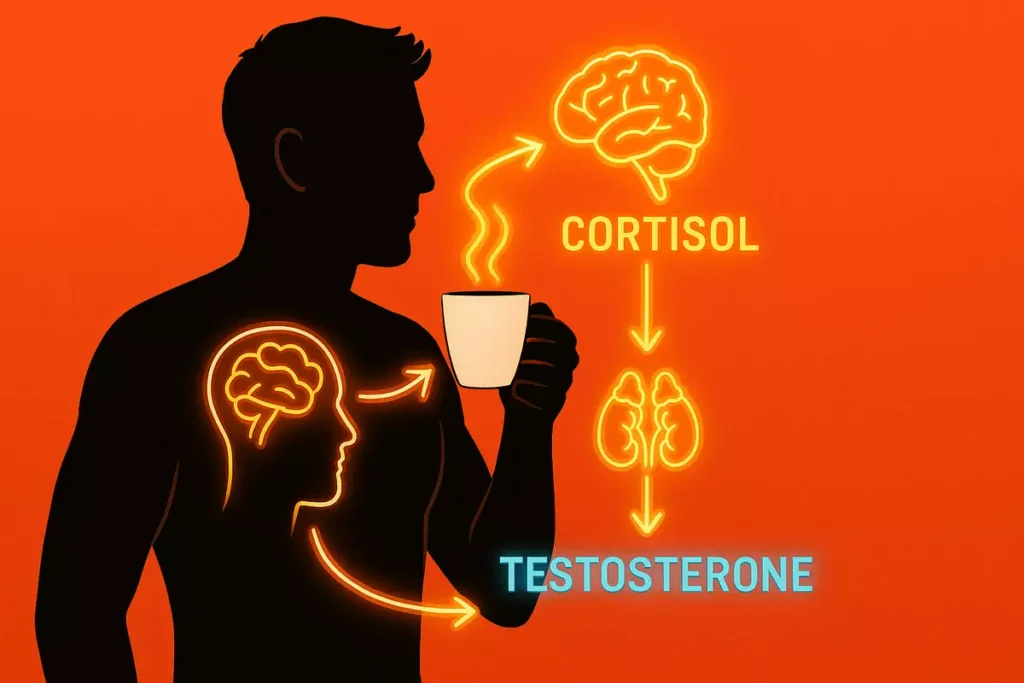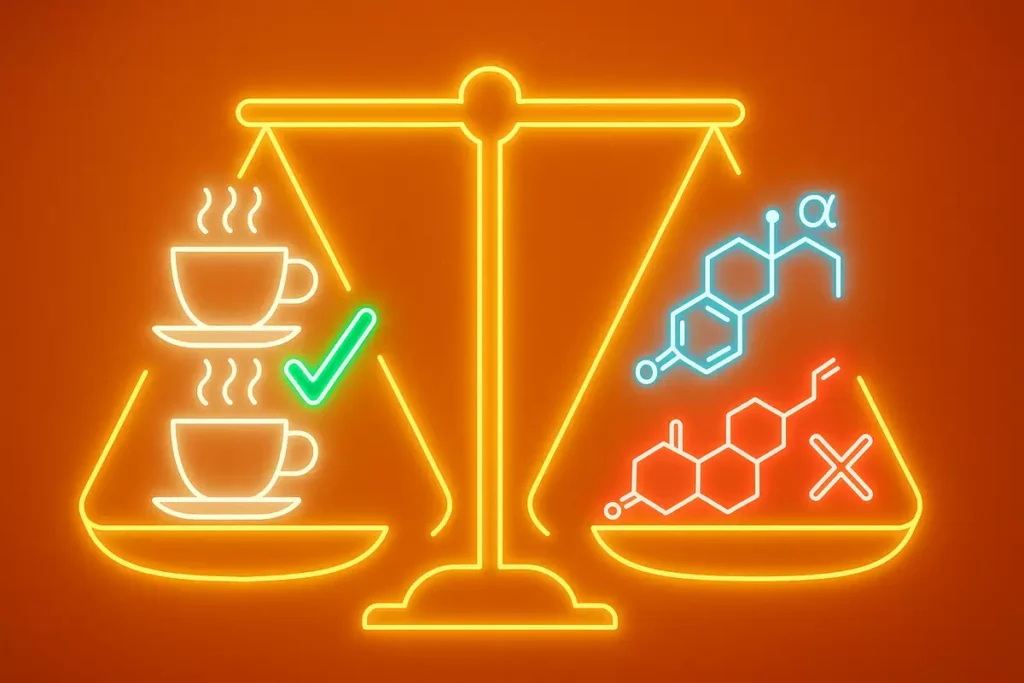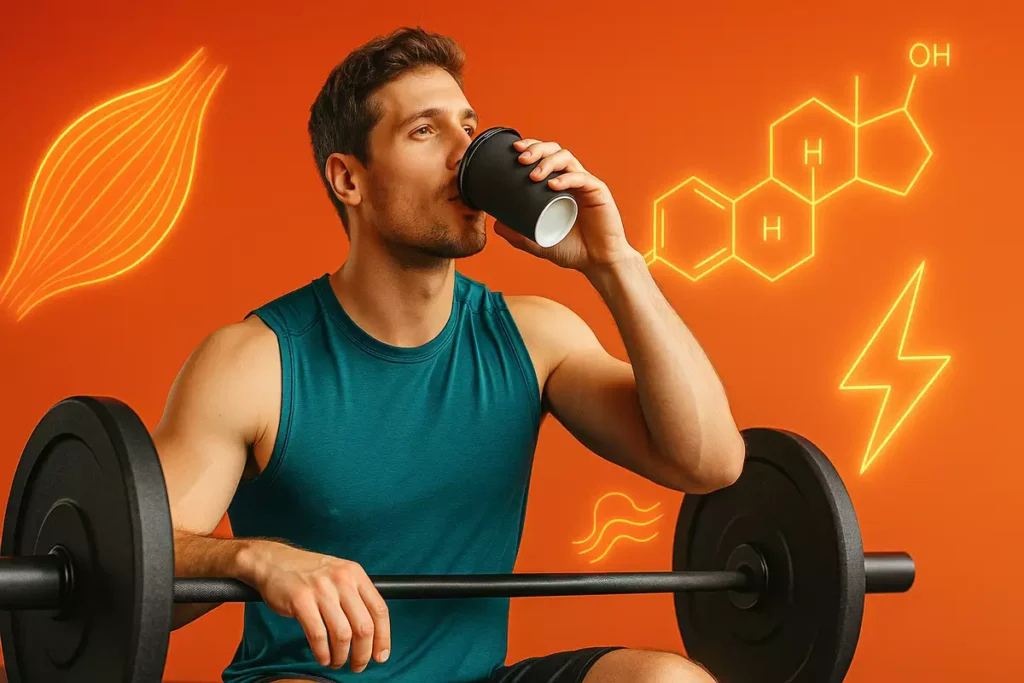Does your daily caffeine fix mess with your hormones—or actually boost your testosterone?
Caffeine is one of the most consumed performance enhancers on the planet. But while it sharpens your focus and fuels your workouts, many wonder: is it messing with your hormonal health behind the scenes?
In this article, I’ll break down how caffeine affects testosterone and other key hormones—backed by science, real client results, and my own coaching experience. If you’re serious about performance, energy, and hormonal balance, you need to understand this link.
Does Caffeine Affect Testosterone?
Let’s cut to the chase—yes, caffeine can impact testosterone, but the effect largely depends on how much you take, when you take it, and your overall lifestyle.
In my personal experience—as both a coach and a guy who’s been through the caffeine rollercoaster—moderate caffeine intake can slightly boost testosterone levels and improve workout performance.
But go overboard, and you may start messing with your cortisol, sleep, and overall hormonal balance.
If you’re stacking caffeine with other performance enhancers, check this detailed beta-alanine, creatine, and caffeine stack guide to do it smart.
How Caffeine Impacts Testosterone Production

Caffeine stimulates the central nervous system, helping you feel more alert and energetic. That stimulation also raises cortisol—your body’s stress hormone.
And here’s the catch: high cortisol can suppress testosterone if it stays elevated for too long.
I remember one intense bulk phase where I was downing 2 energy drinks and a double espresso daily. My lifts felt great, but I was wired all day, couldn’t sleep, and by week three, I felt exhausted.
My motivation dropped, and I had classic signs of hormonal burnout.
Also, caffeine affects sex hormone-binding globulin (SHBG). SHBG controls how much free testosterone is available in your bloodstream.
Some research shows caffeine may slightly lower SHBG, temporarily freeing up more testosterone—but this effect varies by individual and dose.
Caffeine’s Effect on Other Hormones
Let’s not forget that testosterone isn’t working solo. Here’s how caffeine plays with other hormones:
Cortisol
Moderate spikes are fine (especially pre-workout), but chronic high levels from excessive caffeine? That’s a recipe for burnout.
Estrogen
Some evidence suggests caffeine may slightly lower estrogen levels, especially in women. But more studies are needed.
Insulin
High-caffeine energy drinks (with sugar) can mess with blood sugar and insulin sensitivity. Stick to clean caffeine sources.
One of my clients, Mateo from Spain, was drinking 5+ cups of coffee daily and constantly felt anxious and bloated.
We cut it to two moderate servings and swapped sugar-heavy lattes for black coffee. Within 3 weeks, his mood improved, and sleep quality skyrocketed.
If you’re cutting and want to use caffeine smartly, don’t miss this piece on caffeine’s appetite-suppressing effects.
How Much Caffeine Is Safe for Hormonal Health?

For most people, 200–300 mg of caffeine per day is a sweet spot. That’s around 2–3 cups of brewed coffee.
Personally, I stay within that range. Anything over 350 mg, and I start getting jittery, impatient, and wired at night.
Women may need even less to avoid hormonal disruption, especially if dealing with PMS or hormonal imbalances.
The key? Know your limits and listen to your body.
Timing Matters: When to Take Caffeine for Best Results
Timing makes a huge difference in how caffeine affects your hormones. Here’s what I recommend:
- Morning or early afternoon: Ideal to boost alertness without messing with sleep
- 30–60 minutes pre-workout: Enhances focus, strength, and endurance
- Avoid after 4–5 p.m.: Late caffeine intake raises cortisol too close to bedtime
On days I lift heavy, I take about 200 mg caffeine 45 minutes before my session. Usually from clean pre-workout or strong coffee. It never fails to boost intensity.
But if I take it past 5 p.m., I can’t fall asleep before midnight.
If you plan to stack it with beta-alanine, here’s a detailed caffeine + beta-alanine stack guide.
Best Sources of Caffeine for Hormone Support
Not all caffeine is created equal. Here are the best options for supporting your hormones:
✅ Black coffee – zero sugar, pure caffeine
✅ Green tea – gentle and antioxidant-rich
✅ Caffeine pills – controlled dosage, zero additives
🚫 Sugary energy drinks – spike insulin, load your liver
🚫 Overloaded pre-workouts – some pack 400+ mg caffeine per serving
One of my clients, Jake from the U.S., had low energy despite using fancy energy drinks.
We cut those and replaced them with a simple black coffee routine. Within a month, his energy, libido, and focus improved significantly.
Looking for quality options? Check out the best choices in this clean caffeine sources guide.
Caffeine, Training, and Muscle Hormones

Caffeine can be your secret weapon pre-workout. It increases adrenaline and dopamine, both of which boost strength, reaction time, and mental drive.
That can indirectly support testosterone by intensifying your workouts and lifting heavier.
But don’t fall into the trap of depending on caffeine to train. If your sleep, nutrition, or recovery is off, no amount of caffeine will save your hormones.
I’ve seen it in myself and countless others—use caffeine as a tool, not a crutch.
To dive deeper into this, check out how creatine and caffeine interact during training or learn about caffeine-induced dehydration during workouts.
Final Verdict: Should You Worry About Caffeine and Testosterone?
In most cases, moderate caffeine helps more than it harms—especially for active people with healthy sleep, nutrition, and stress levels.
But if you’re:
- Drinking more than 4–5 cups/day
- Experiencing poor sleep, anxiety, or irritability
- Relying on caffeine to function
…then your hormones may already be out of sync.
What I do (and suggest to clients):
👉 Cap caffeine at 250–300 mg/day
👉 Use it pre-workout or early in the day
👉 Deload every 6–8 weeks (I do a 7-day reset with green tea only)
It works like magic—less tolerance, better sleep, and a more natural energy rhythm.
FAQ
Q: Does quitting caffeine boost testosterone?
It can if your caffeine use was excessive. Reducing caffeine may lower cortisol, improve sleep, and balance your hormones long-term.
Q: Can caffeine cause hormone imbalance in women?
Yes, especially in high doses. It may increase PMS symptoms or interfere with estrogen levels. A personalized approach is best.
Final Tip:
Control your caffeine before it controls you. Use it to enhance your training and lifestyle—not to fix what your recovery, diet, or mindset should be doing.
Stay sharp, train hard, and keep it balanced.



Leave a Reply